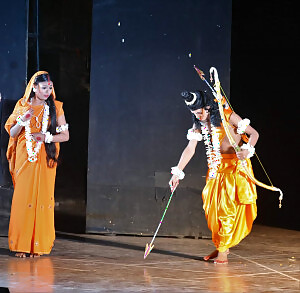
views
Guwahati: Three friends get ready for the rehearsal of ‘Ravan Badha’ Bhaona — a 500-year old traditional Assamese art form propagated by Vaishnavite saint and reformer, Srimanta Sankardeva. Fourteen-year-old Rahat Rahman plays the role of Lakshman from the Hindu epic Ramayana, along with two of his schoolmates – Niyor Hazarika as Vanara Vali and Uddipta Saikia as Indrajit.
It is for the first time that Bhaona would be presented in English for an international audience – an initiative of ‘Prajanma Unmesh’, a socio-cultural organisation of Assam that endeavours to popularise the Vaishnava theatrical performance for global art connoisseurs, and familiarise them with Assamese culture and traditions. Dubai residents and tourists will have an opportunity to witness the performances on November 1.
Sita: “Brother Lakshman, your brother Ram is in danger, please go immediately.”
Lakshman: “Mother Sita, I scratch this divine circle. Please don’t come out of this. Now, I am going to save brother Ram.”

After a high-calibre training with other artistes, Rahat and his friends are enthusiastic about their first stage performance in English. Bhaona, the applied aspect of ‘Ankiya Naat’ or plays written in Brajawali, is generally staged at the precincts of a ‘Namghar’ or prayer house where people from all walks of life come together to watch colourful performances enriched with narration, songs, music and dance. People are left spell-bound watching the demons and animals – the performers wearing huge masks and sparkling costumes enacting mythological stories from the Ramayana, Mahabharata or Bhagavata Purana.
“We practiced for almost an hour after school. I came across Bhaona through my friends in the neighbourhood village – we are from the same school. This is the first time I would be performing a Bhaona, and I am grateful to my parents for encouraging my effort. I like the ideology of Saint Sankardev, his vision of equality for all, irrespective of caste, creed or religion,” said Rahat, who is a class 9 student at Holy Child English School, and would play the role of both Lakshman and Sugriva, younger brother of Vali.
Conceptualised, directed and translated into English by Arup Saikia, a resident of Jamugurihat in Assam’s Sonitpur district, the two plays – ‘Ravan Badha’ and the Ankiya Bhaona ‘Kelly Gopal’ that was authored in Brajawali by Sankadeva – will be performed by a troupe of 40 artistes including local musicians – the gaayan (singers) and baayan (instrumentalists).
“Very few people outside Assam know about Saint Sankardeva. So, this idea came to my mind to translate and perform his unique creation – ‘Bhaona’ in English other than Brajawali – to popularise it among the new generation across the globe. No renowned intellectual asset can be kept in the narrow periphery of a particular language,” said Saikia, adding that he has been true to the original work, and is proud to involve people from all communities in keeping with Sankardeva’s vision of universality.
“Although Bhaona is a creation of Vaishnavite movement of Hinduism, in terms of Sankardeva’s vision of building Assam, his religion is universal and of secular credential. Religion is to serve people, not to divide. Sankardeva’s famous devotee, “Candsai” was a Muslim who laid the foundation stone of a Namghar in his presence.”
However, Saikia said he is facing opposition from a section of people who are not ready to accept this change in language or concept.
“I am facing resistance from a section of conservative people with traditional values and ideas, some so-called custodians of Sankadeva’s legacy opposed to change or innovation. Everything is changing always, we only have to keep the roots of the tree intact, but branches can be shaped accordingly. Our next generations can imbibe the dramatic and philosophical notion of Bhaona when performed in English,” he said, while also drawing attention to other challenges.
“Financial constraints are related to any project, and we are facing it. The government has given us an assurance, but not favourable response. It is also a difficult task to select artists to perform abroad,” remarked Saikia.
Apart from local actors, the group includes 24 international artistes who have attended a special Bhaona workshop in Russia.
“It is the first time that Assamese artistes would perform the Bhaona at an international platform in English language. We are associated with the Assam Society there. We have already performed in India, and had earlier conducted a workshop in Russia with local artistes,” said Gitimalika Baidya, coordinator at Prajanma Unmesh.
Earlier this year, the troupe had performed the ‘Udyog Parva’ Bhaona, a traditional Brajavali script translated into English for well-engaged audiences in Mumbai and Delhi.




















Comments
0 comment